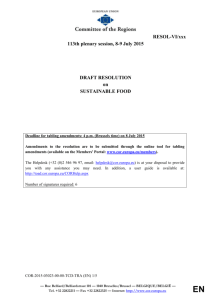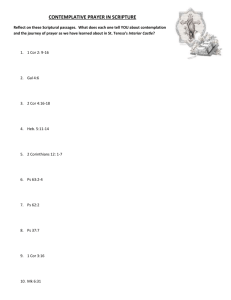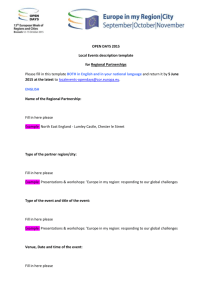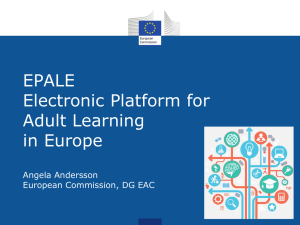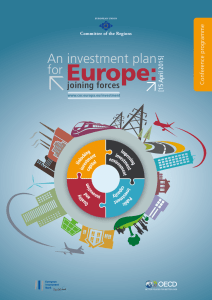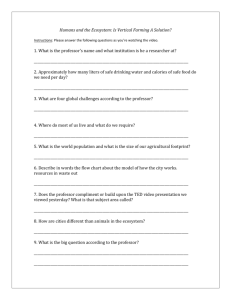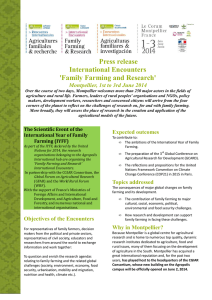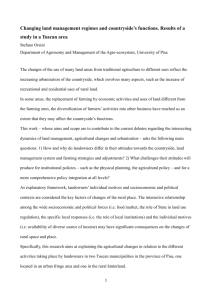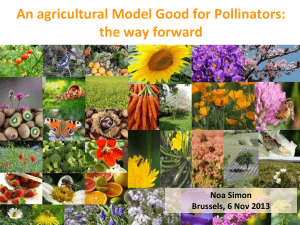Resolution on "Sustainable Food"
advertisement
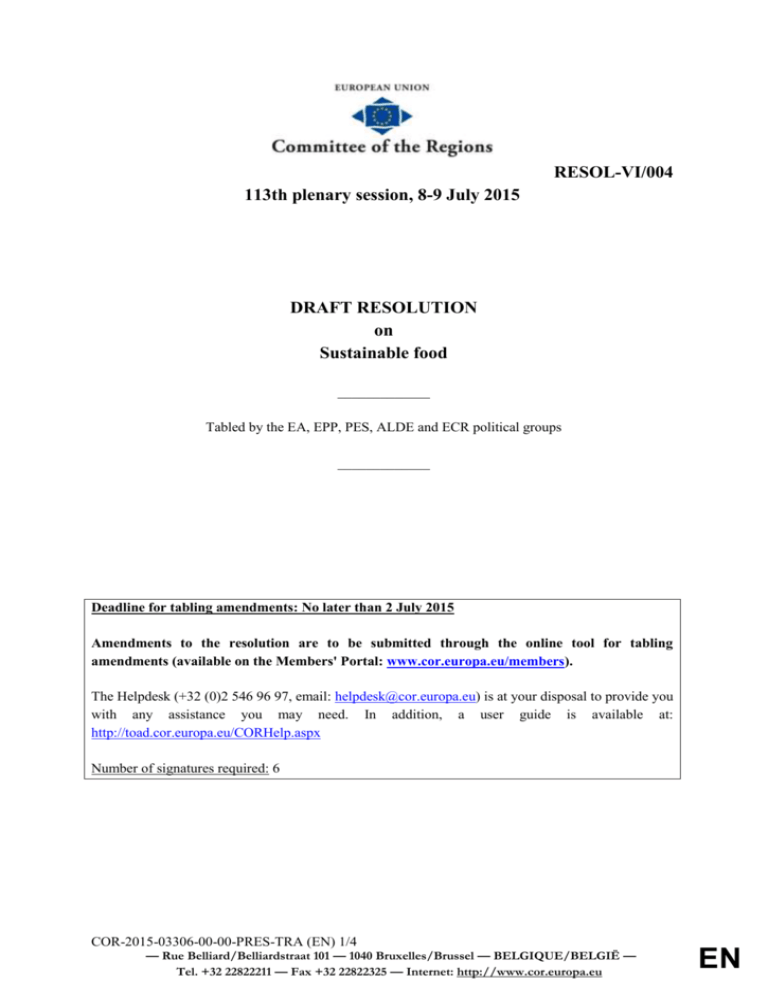
RESOL-VI/004 113th plenary session, 8-9 July 2015 DRAFT RESOLUTION on Sustainable food _____________ Tabled by the EA, EPP, PES, ALDE and ECR political groups _____________ Deadline for tabling amendments: No later than 2 July 2015 Amendments to the resolution are to be submitted through the online tool for tabling amendments (available on the Members' Portal: www.cor.europa.eu/members). The Helpdesk (+32 (0)2 546 96 97, email: helpdesk@cor.europa.eu) is at your disposal to provide you with any assistance you may need. In addition, a user guide is available at: http://toad.cor.europa.eu/CORHelp.aspx Number of signatures required: 6 COR-2015-03306-00-00-PRES-TRA (EN) 1/4 — Rue Belliard/Belliardstraat 101 — 1040 Bruxelles/Brussel — BELGIQUE/BELGIË — Tel. +32 22822211 — Fax +32 22822325 — Internet: http://www.cor.europa.eu EN THE EUROPEAN COMMITTEE OF THE REGIONS, 1. welcomes the fact that the Expo 2015 on "Feeding the planet. Energy for Life" coincides with the European Year of Development, and the target implementation date of the eight Millennium Development Goals on eradicating poverty and hunger and ensuring environmental sustainability; 2. highlights that the EU should maintain its high standards in terms of food safety and food security as qualities which help to distinguish EU products globally; 3. notes that the world is currently facing a diverse and significant set of challenges: continued population growth and growth in spending capacity, triggering changes in dietary demands (variety, primary products and high-quality products) combined with threats to global agricultural production capacity as a result of climate change; 4. welcomes the fact that sustainable development has become the sine qua non of any socioeconomic growth policy and calls for more political commitment at all levels of governance involving resources in all sectors; 5. highlights the need to reinforce the links between different sectors related to food such as energy, forestry, marine resources, water, waste, agriculture, climate change and land use aspects, as all of them play a crucial part in delivering green economy; 6. in this context calls for agriculture and the food supply chain to be more sparing in their use of water and fossil fuels, use less fertiliser and phytosanitary products, be more diversified and smarter in making the most of synergies between arable farming, livestock farming, organic waste management, residue streams and use various sources of energy; 7. notes that farming is very important for the development of balanced and more cohesive territorial areas, especially rural areas, as it provides employment for almost 30 million people; notes that rural areas account for 90% of the Union's territory and are home to 60% of its citizens but are often less developed economically than urban territories; 8. recalls the objectives for the future set out by the Common Agriculture Policy in the areas of sustainable management of natural resources, food security, agricultural activity across Europe, balanced regional development, the competitiveness of European farming and the simplification of the CAP; reiterates its critical position on the insufficient measures introducing greater competition for small and medium farms; 9. considers that rural areas are among the most vulnerable areas affected by climate change; therefore calls for the inclusion of climate mitigation and adaptation measures to territorial planning, management and budgetary instruments so that participatory mechanisms and farming practices can be used to facilitate sustainable development; 10. in view of current lifestyle trends present in urban communities, proposes to promote the benefits of living in rural areas. Initiatives forging close links between farmers and food COR-2015-03306-00-00-PRES-TRA (EN) 2/4 consumers can significantly contribute to the development of peri-urban areas and another kind of rural-urban relations including territorial partnerships in functional areas; 11. calls for short supply chains for agricultural products as they help to develop sustainable production and responsible consumption. They meet a growing demand from consumers for authentic, seasonal, locally and community-produced products. This is also a socially conscious model of consumption that is respectful of the environment, cuts down on packaging and food waste, limits CO2 emissions and supports sustainable production practices; 12. notes that local food production not only creates new jobs locally and new skills but can also contribute to economic and social development of our regions, preventing depopulation flows or excessive urban demographic pressure; 13. calls for organic and non-GMO food to form a significant part of a sustainable diet; recalls that many regional and local authorities have opposed genetically modified (GM) crops in their territories, declaring themselves to be "GM-free areas", and formed networks; considers that it is important to promote the spread of organic and, where possible, locally produced food in schools and hospitals through green public procurement at local and regional level; 14. recommends improving the aid scheme for the distribution of fruit and vegetables and milk in schools by providing the option of switching national aid allocations; given the degree of processing of products eligible for aid under this scheme and given the importance of the principle of establishing a healthy diet at an early age, suggests that financial support under the aid scheme should be limited to products that are unprocessed or minimally processed, and which contain no harmful additives, sweetening agents, flavour enhancers or salt; 15. reiterates its request to the European Commission to promote reduction of food waste1 and to retable a proposal for a food waste reduction objective of at least 30% by 2025, based on its withdrawn proposal from 2014 amending the Waste Framework Directive to promote a circular economy; in this context, supports the European Parliament's call for 2016 to be dedicated to the European Year against Food Waste; 16. notes that more than a third of tourist spending is devoted to food; underlines that food tourism has the potential to deliver job sustainability across the year and can lead to the creation of job opportunities; underlines that this can play a key role in local and regional growth and cohesion as well as the preservation of cultural heritage; 17. calls for an awareness raising campaign for citizens on the value of genetic resources and the importance of conservation, research and sustainable use where these are concerned as well as training programmes which are tailored to market demands for engineers and farmers, along with coordination, monitoring and assessment measures to safeguard biodiversity in the agricultural sector; 1 CdR 140/2011 fin, http://portal.cor.europa.eu/europe2020/MonitoringFlagships/Pages/A-Resource-Efficient-Europe.aspx COR-2015-03306-00-00-PRES-TRA (EN) 3/4 18. highlights the role that local and regional authorities play in adapting educational and professional skills of young people to the job market in rural areas; is committed to supporting and communicating regional and local best practices of innovative processes in food production, distribution and consumption methods; calls for increased awareness and societal acceptance by providing dietary education and encouraging good habits, using food and other resources more efficiently; 19. supports an effective monitoring of compliance with the rules of food and feed law and other rules on animal health and welfare, plant health, plant reproductive material and plant protection products that serve to build a stable market which is based on public confidence in these products; 20. recalls the contribution of the Common Fisheries Policy to EU sustainable food production; calls for better promotion of the objectives of the Common Fisheries Policy internationally. To this end, the Union should strive to improve the performance of regional and international organisations in conservation and management of international fish stocks by promoting decision-making based on science and improved compliance, increased transparency and stakeholder participation, especially fishermen, and by combating illegal, unreported and unregulated fishing activities; 21. emphasises the need to work closely with the fishing industry via public-private partnerships as well as to connect businesses and research to ensure that the fishing industry is not only sustainable, but also competitive and innovative; 22. stresses that aquaculture production must be treated as a strategic sector (on a par with other primary sector production areas) when it comes to responding to future challenges in the areas of food resources, natural resources and regional development; 23. takes the view that the EU should lead the way in the development of ecological and sustainable fish farming methods, pioneering the "blue revolution" by applying technology and innovation to fish production, feeding, hatching and harvesting within the EU. _____________ COR-2015-03306-00-00-PRES-TRA (EN) 4/4
